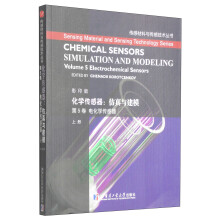传感材料与传感技术丛书·化学传感器:仿真与建模(第5卷·电化学传感器 上册 影印版)

作者:[摩尔]科瑞特森科韦,Korotcenkov(G.)编
出版:哈尔滨工业大学出版社 2015.1
丛书:传感材料与传感技术丛书
页数:408
定价:90.00 元
ISBN-13:9787560348988
ISBN-10:756034898X 去豆瓣看看
出版:哈尔滨工业大学出版社 2015.1
丛书:传感材料与传感技术丛书
页数:408
定价:90.00 元
ISBN-13:9787560348988
ISBN-10:756034898X 去豆瓣看看
This series, Chemical Sensors: Simulation and Modeling, is the perfect complement to Momentum Press's six-volume reference series, Chemical Sensors: Fundamentals of Sensing Materials and Chemical Sensors: Comprehensive Sensor Technologies, which present detailed information about materials, technologies, fabrication, and applications of various devices for chemical sensing. Chenucal.sensors are integral to the automation of myriad industrial processes and every-day monitoring of such activities as public safety, engine performance, medical therapeutics, and many more.
Despite the large number of chemical sensors already on the market, selection and design of a suitable sensor for a new application is a difficult task for the design engineer. Careful selection of the sensing material, sensor platform, technology of synthesis or deposition of sensitive materials, appropriate coatings and membranes, and the sampling system is very important, because those decisions can determine the specificity, sensitivity, response time, and stability of the final device. Selective functionalization of the sensor is also critical to achieving the required operating parameters. Therefore, in designing a chemical sensor, developers have to answer the enormous questions related to properties of sensing materials and their functioning in various environments. This four-volume com-prehensive reference work analyzes approaches used for computer simulation and modeling in various fields of chemical sensing and discusses various phenomena important for chemical. sensing, such as surface diffusion, adsorption, surface reactions, sintering, conductivity, mass transport, inter phase interactions, etc. In these volumes it is shown that theoretical modeling and simulation of the processes, being a basic for chemical sensor operation, can provide considerableassistance in choosing both optimal materials and optimal configurations of sensing elements for use in chemical sensors. The theoretical simulation and modeling of sensing material behavior during interactions with gases and liquid surroundings can promote understanding of the nature of effects responsible for high effectiveness of chemical sensors operation as well. Nevertheless, we have tounder stand that only very a few aspects of chemistry can be computed exactly.
Despite the large number of chemical sensors already on the market, selection and design of a suitable sensor for a new application is a difficult task for the design engineer. Careful selection of the sensing material, sensor platform, technology of synthesis or deposition of sensitive materials, appropriate coatings and membranes, and the sampling system is very important, because those decisions can determine the specificity, sensitivity, response time, and stability of the final device. Selective functionalization of the sensor is also critical to achieving the required operating parameters. Therefore, in designing a chemical sensor, developers have to answer the enormous questions related to properties of sensing materials and their functioning in various environments. This four-volume com-prehensive reference work analyzes approaches used for computer simulation and modeling in various fields of chemical sensing and discusses various phenomena important for chemical. sensing, such as surface diffusion, adsorption, surface reactions, sintering, conductivity, mass transport, inter phase interactions, etc. In these volumes it is shown that theoretical modeling and simulation of the processes, being a basic for chemical sensor operation, can provide considerableassistance in choosing both optimal materials and optimal configurations of sensing elements for use in chemical sensors. The theoretical simulation and modeling of sensing material behavior during interactions with gases and liquid surroundings can promote understanding of the nature of effects responsible for high effectiveness of chemical sensors operation as well. Nevertheless, we have tounder stand that only very a few aspects of chemistry can be computed exactly.
比价列表价格走势








 缺书网
缺书网 扫码进群
扫码进群